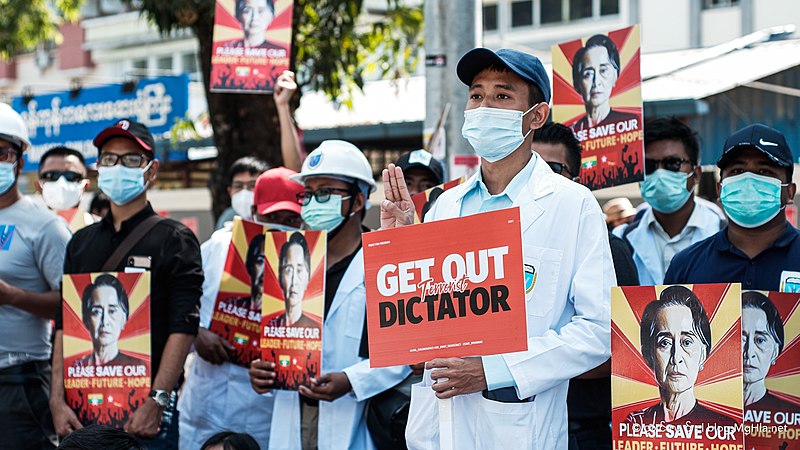A day does not go by without the media providing updates about the state of the cease-fire in Gaza, or new stories about thousands protesting against the Israeli-Hamas war. Yet few Americans know that thousands of people are fighting for their independence right now in a country that few have heard of and even fewer can pronounce.
Myanmar is home to natural wonders and ornate,1,000-year-old temples withstanding the test of time, and nestled between some of the most famous world powers. Bordered by Thailand, Laos, China, India, and Bangladesh, but still isolated from the world economy, Myanmar is facing a fight between rebels and a junta (a dictatorship) that took over three years ago and is suppressing individual liberties, freedom, and equality. Yet its current woes are nothing new to a country that has struggled for centuries.
A Tattered History
Formerly known as Burma, Myanmar has faced socio-economic, civil, and religious struggles since its inception as a British colony in 1885. Before then, the country was ruled as a collection of city-states under numerous dynasties such as the Pagan, Taungoo, and Konbaung. Reforms under these dynasties allowed a rich and dynamic culture to form.
According to The Diplomat , while under British rule, Burmese citizens, both native and immigrant, often became exploited and tensions rose between different ethnic groups within the region. It remained under British control until it gained independence in 1948. During World War II, Burma was devastated by Japanese rule and warfare in the region.
After it gained its independence, Burma was in a fragile state and decided on complete neutrality and a policy of peace. Yet its first insurgents were from within its weakened government. According to Britannica, between 1962 and 2011, Burma was ruled by a military government as a socialist state. It was renamed Myanmar in 1989 in an attempt to step away from the bloody connotations of the country’s former name.
In the mid-2010s Myanmar began to make a series of changes to step away from its socialist roots and become a more liberal nation. During this time, hundreds of political prisoners were released and Myanmar’s importance on the world stage increased, with Barack Obama meeting with Myanmar’s State Counselor Daw Aung San Suu Kyi to speak on joint plans between the two nations.
2021 Myanmar Coup D’état
After political tensions continued to boil, the nation’s military staged a coup d’etat on Feb. 1, 2021, and seized power within the government. According to The Guardian, “In the weeks following the coup, huge numbers of people took to the streets for mass protests. The military responded with deadly violence and imposed a campaign of terror, raiding homes and arresting anyone suspected of supporting democracy.” Kyi and other pro-democracy state officials and civilians were jailed, detained, or deposed. Many were put in solitary confinement.
Emergence of the Resistance
In the almost three years since the coup, numerous civilian militia groups have taken up arms against the junta. Outlook India explained in a new article titled “Operation 1027’ And The Flare Up Of Myanmar’s Civil War” that at the end of October of this year “Operation 1027” was launched by the Three Brotherhood Alliance, three ethnicity-based groups of armed forces in the Shan State of Myanmar near the China border to push the military dictatorship out of power.
Civilians and the armed forces have begun to take back their homes and towns, but millions of people are still being affected by the warfare. CNN News said in a recent update on the campaign, “Junta airstrikes and ground attacks on what the Myanmar military calls ‘terrorist’ targets have killed thousands of civilians to date, including children, and displaced about 2 million people.
While some say that there will be no revolution for the people of Myanmar, others say it is truly the downfall of the military that is in the making. As noted by Vox in an article about the Three Brotherhood Alliance “So far, the revolutionary forces have successfully cut off about 40 percent of the Tatmadaw’s land access to China, taken over military installations, major border crossings, several towns, and transit routes — as well as forced government troops to defect en masse.”
In an article published by the Diplomat titled “Meet the Extraordinary Fighters of Myanmar’s Resistance,” commander-in-chief of the Mountain Eagle Defense Force (MEDF) Valthanmawia expressed his enduring support for the joint opposition against the junta. “We will have to defend our villages with whatever resources we have. The strategy has been fine-tuned, focusing on our advantages, which include the unflagging commitment of all the members of the group. We will die defending our village,” he said.
Why What Happens in Myanmar Should Matter to Americans
It’s easy to overlook what is happening halfway across the world in a country fifteen times smaller than America. However, what happens to democracies everywhere is of concern to many nations. On Twitter (now X) former U.S. President Barack Obama noted of the junta’s new regime, “Myanmar’s neighbors should recognize that a murderous regime rejected by the people will only bring greater instability, humanitarian crisis, and the risk of a failed state.”
When Obama met with Myanmar’s former civilian leader Aung San Suu Kyi (who is now imprisoned in solitary confinement) he said he had high hopes to advance the new Myanmar democracy. Now, our goal as Americans should be to preserve it. “These are dark times,” Obama said, “but I have been moved by the unity, resilience, and commitment to democratic values demonstrated by so many Burmese, which offers hope for the kind of future Myanmar can have through leaders who respect the will of the people.”







